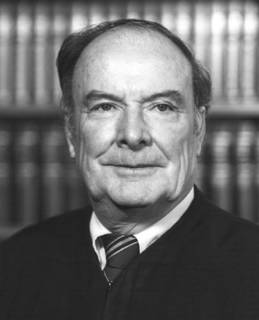How Can You Not Defend 'Those People'?
From Across the Pond to Blonde Justice, the old question comes up: how can lawyers represent people who they know are guilty?
The quickest reply is usually along the lines of "Who am I to judge?" (which incidentally would not the best slogan for a p.d. seeking judicial office). It's common for criminal defense lawyers to say, "I don't know whether or not my client's guilty, that's the jury's job, not mine." It's also the case that most of us consider asking our client, "so, did you do it?" well, a bit gauche.
The more thorough justification points to our role and our self-understanding as advocates in an adversarial system, checks on government power, and protectors of the Constitution. We hold the state to its proofs, we fight to exclude the bad statements and stuff that the cops have cut corners to obtain, and in trial we flog the hell out of reasonable doubt no matter what our personal opinion may be of our client's guilt. You take it to the extreme, though, and it can be anything goes to get the client off.
Blonde Justice's answer is a good one, sticking up for the underdog, and appreciating the clients' humanity. It draws a lot on the insight that young prosecutors sometimes seem to lack: There but for the grace of God go I.
God's grace, and a source of authority over 1700 years older than the Bill of Rights, is where Crim Law finds his answer, and I suspect it's one that sustains him a great deal when he's in visiting with the hateful client accused of ghastly things. It is an eloquent vision of a lawyer's role in preventing further harm and resisting human vengeance. Even if you aren't a person of religious faith, maybe just someone striving to do criminal defense work with integrity, it will benefit you to give Elder Crimlaw a fair hearing. I'm fairly sure that he would agree with St. Thomas More in A Man for All Seasons: "Yes, I'd give the Devil benefit of law, for my own safety's sake."
Back when I hit a bump on answering this question to myself, I got help, and a new job description, from a section of The Lawyer's Calling by Joseph Alegretti titled "The Lawyer as Companion of the Guilty":
"Everyone, even the guilty criminal--especially the guilty criminal!--needs a companion, a friend, someone to stand with him and for him."
"The defense lawyer's job is to force the system to acknowledge that the defendant is not just a social misfit, or a statistic, or a criminal, but a human being with hopes and dreams and fears. A human being who, like any of us, stands in need of repentance and redemption."
"The question for the Christian lawyer is not, 'How can you work to get a guilty person off?' The real question is, 'Will you stand by this person, this flawed and sinful human being, and speak a word on his behalf?'"
Our recessional hymn is from Say Amen Somebody by the O'Neal Twins, Jesus Dropped the Charges:
I was guilty of all the charges
doomed and disgraced
but Jesus with His special love
forgave me by His grace
He pleaded, He pleaded
He pleaded my case
Jesus dropped the charges (repeat)
Now I'm saved through grace and faith
I was guilty for so long
Lived in sin too long
but Jesus with His special love
reached down with an arm so strong
He picked me up and turned me around
gave me a brand new start
Jesus dropped the charges (repeat)
Now to Him I belong
You may remember, remember
some of the things I've done
but Jesus with His special love
forgave me for every one
He put me on the right road
lifted my heavy load
Jesus dropped the charges (repeat)
Now I'm free down in my soul
He dropped the charges
Jesus dropped the charges
although I was wrong
He dropped the charges
Jesus dropped the charges
showed me right from wrong
He dropped the charges
Jesus dropped the charges
and cast them all away
At Calvary I heard Him say
At Calvary I heard Him say
At Calvary I heard Him say
Case dismissed, case dismissed
saved by grace!
We now resume our regular secular schedule.






0 Comments:
Post a Comment